- Home
- Marina Oliver
Convict Queen Page 9
Convict Queen Read online
Page 9
Her mother would have died from shame, had she not been dead already. Her father would be unable to hold up his head, and would probably lose both his home and all the work John Maebury gave him. And she'd never see her children again. They would be orphaned, homeless, forever pointed to as the offspring of criminals.
She had to try and escape. If only she could get away from the Sun, she might be able to hide, until she could find her children and disappear, perhaps into the Welsh mountains, or into the industrial towns of the Black Country, where there were so many people they'd never find her.
There were bars on the window, and all night she did everything she could think of to try and loosen them, but they remained firm. She couldn't squeeze between them. She collapsed finally with sheer weariness, crouching below the window and waiting for the dawn. William had deserted her, leaving her to pay for his crime. Her children were as good as orphans, and she'd never see them again. But she determined she would not allow them to hang her.
Summoning up a last burst of strength she punched the glass beyond the bars, and broke off a large piece. She looked at it and took a deep breath, then stretched her neck and drew the sharp point of the glass across it. If she had to die, she would die by her own hand.
*
CHAPTER 6
William looked down from where he was hidden in the branches of a black poplar. Johnny Cound was too fat with good living to run fast, and he'd soon outdistanced him until he was able to swing up into the tree. By lying along one of the thicker branches he'd been completely hidden from below, even if that miserly cur had thought to look above his head.
The little rat had always held a grudge against Molly since they were children. Just because she was quicker and cleverer than he was, and had pushed him away when they were older and he'd fancied her.
For a moment the thought of Molly made him wince. If only he could have loosened her bonds as well they could both have got away. But Molly was clever. She'd deny all fault, and they'd soon let her go. Meanwhile, he couldn't afford to stay in the area. He had to escape, before they sent out other people to catch him.
He watched Johnny Cound give up the chase and turn back towards the others. Good, he could get away soon. But where? He daren't ask his brother to hide him. But he had cousins at Stokesay. They'd help, give him some food and perhaps some money, and then he'd make for Wales. Surely in those mountains, where most of the time there were only rough tracks, he'd be able to hide. It was still summer, he could catch rabbits, and fish, snare a few birds. Then he could stop and think what to do. Perhaps he'd be able to get on a ship. There were docks at Cardiff, somewhere to the south, he'd heard. Or Bristol. He'd work his passage, perhaps get to America, save some money, and then send for Molly. He took little heed of events in the world outside Corvedale, but he thought he remembered someone in the Sun saying the war with America was over, so there should be no problems getting there.
By the time he'd thought this through Molly and the men had disappeared, and it was safe to come down and set out for Stokesay. Two hours later he was sitting in his cousin's kitchen, trying to explain what had happened.
'I was lookin' after it for John Maebury,' he said for a second time. 'I dain't know some of it belonged to Mr Cound. If John Maebury 'ad been there they'd 'ave known, not come after me. But they was too keen to blame me.'
'If you'd stayed, you could have explained.'
'Molly will tell them. But Mr Cound would never 'ave believed me. And Johnny's always held it agin me since he wanted Molly and she'd 'ave nothin' to do with him.'
His cousin sniffed. 'So you left Molly to face them. William, I want nought to do with it. You can take some food, and I can spare a couple of shillin's, but get away from here, and if they catch you, don't mention my name. I'll deny you were here. It's an offence to help a felon get away.'
'I'm no felon, it were a misunderstanding.'
They wouldn't believe him, but they gave him some cold, boiled potatoes and a loaf, and a couple of shillings, and he set off. While he'd been resting after the walk to Stokesay he'd thought again about the long walk south, and found he didn't relish it. If he went to Welshpool he might get a job on a river boat, and travel in comfort all the way to Bristol. They wouldn't expect him to do that, circling round them while they were hunting further and further away. Feeling pleased with his cleverness he struck off along the Onny valley. There were plenty of places to hide there, if by any chance he was followed. It was growing dark by now, but he'd walk all night, following the river, then find somewhere to hide and sleep during the day. He'd get away. They wouldn't capture him. And surely, once Molly explained, they'd let her go. She'd be all right. She earned money sewing, and the children were old enough for her to get farm work like she used to do. He began to think what life would be like without her and his son, and the little girl got on her by William Gough, who was a nice enough lass, but consoled himself with the thought that soon, when he'd found a safe place in America, they could all be together again.
*
For over a week Molly lay in that small upper room at the Sun, a prey to misery and despair. She hadn't even been able to kill herself. They'd found her, sewn up the cut, which was not deep, and kept her imprisoned. For the first few days no one apart from John Maebury saw her, but after a while he took pity on her frantic questions about her children.
'Your brother John's taken little lass, and Mr Heighway's got young James,' he said gruffly.
'Mr Heighway? Oh, what will he do with him? Put him in an orphanage?'
Mr Heighway was Overseer of the Poor in Cold Weston, a stern man, and Molly could not imagine him taking the boy into his own household.
'Your Dad and brothers will see no harm comes to him. You haven't asked about William.'
For a blank moment she thought he meant William Gough, and wondered what he had to do with it. Then Maebury went on and she realised her mistake.
'Did they catch him?' she asked, though thinking of the way her husband had deserted her, she did not really care.
John Maebury snorted. 'Aye, the Counds and John Powell went after him. His cousin at Stokesay was persuaded to tell 'em he was heading for somewhere in Wales. They caught up with him near Montgomery.'
'Then, where is he now? Is he here as well?'
Molly began to hope. William could tell them she had not known about the hemp, and they'd let her go. She felt sorry for him, but he'd brought it on himself. She wanted to get back to her children. They'd manage without him. He'd probably hang, but there was nothing she could do about that.
John Maebury snorted again. 'The fools let him go. They were riding, and put him on a donkey. There were some soldiers in the town, drunk as lords, and they found it funny. They started to mess about, joking and jeering, and in the confusion one of 'em grabbed the donkey's bridle and dragged him away. By the time the Counds and Mr Powell got free of 'em your William had vanished. They stayed there a day or so, but by then he'd found somewhere to hide.'
He won't come back to tell them the truth, that I had nothing to do with it, Molly thought. Perhaps they'd believe her anyway. They must! If they didn't, she'd go to the gallows, she'd hang.
*
Molly was standing by the window, staring out at the fields, when she heard the key turn in the lock and the door open. Thinking it was John Maebury with the broth he normally provided for her dinner, she did not look round until her name was spoken. Then she whirled round, and took a step towards the doorway.
'Johnny Cound! What are you doing here? Have you found William?'
'What would you be wanting with that coward? He left you, didn't he? Left you to face the gallows while 'e gets off scot free.' He drew his hand across his neck. 'That's not anything to look forward to, your neck stretched, your tongue sticking out, a pretty lass like you. Have you ever seen a hanging?'
Molly tried not to visualise the scene. She was having nightmares about it already. 'What chance would he have had? I'm glad one of u
s got free.'
'You could be free too. I'd get the others to drop charges, say it was a mistake. If you promised to be nice to me.'
'Nice?'
'You know I've always wanted you. Wouldn't you rather warm my bed than swing at the end of a rope?'
She laughed. 'I'd rather swing than be your doxy!'
He flushed. 'If that's what you want, you'll get it! You always was too big for your boots, Molly Jones! Well, you've 'ad your chance, an' you won't get another.'
He flung out of the room, slamming the door. The key was turned in the lock, and Molly sank onto the bed. Had she been too hasty? Could she not have pretended, at least until she was free? She shuddered. The very idea of Johnny Cound's hands on her made her want to vomit. There must be some other way. She was innocent, at least of the theft, and they would have to believe her.
*
Prison was worse than Molly had ever imagined. She'd been taken to Shrewsbury without having any chance to speak to her father. When she was still weak from having cut her throat, John Powell had committed her for trial. She could scarcely believe it. He'd known her all her life. Though he was officially Vicar of Pennington in Lancashire he had lived at Sutton Court for decades, and was Curate at Diddlebury as well as being a great landowner and local Justice. He'd baptised her and her two children, he'd married her to William. Surely he didn't believe what the Counds told him? He'd know the fault lay with William, and she, in the panic of the moment, had only been trying to help him. She'd have made him take the hemp back if they'd had a chance.
No one would listen to her. She was told to keep quiet, stop making a fuss, and threatened with punishment if she did not. When they came for her she contemplated throwing herself off the cart and trying to find someone who would help her, but she was shackled, and had to endure the stares of the curious as the cart rattled its way northwards. She could scarcely contain her fury, and wanted to hide her head in shame, but instead glared defiantly at the onlookers. She'd been to Shrewsbury just a couple of times, and had once seen handbills advertising a public hanging. For weeks afterwards she'd suffered bad dreams. Now she was herself in danger of being hanged. As the cart trundled across the English Bridge and up the hill towards the castle and the prison Molly had difficulty in restraining her tears. She was completely alone. She'd heard no more about William, whether he had been recaptured. Her children would be bewildered, thinking both their parents had deserted them. The only crumb of comfort was that her mother was dead and could not see her shame.
Thrown into a cell with several other women, some awaiting trial, others already sentenced and serving their time, she sank down onto a rancid heap of straw and wept. It was almost the end of May, and little air penetrated the small barred window. Gradually, however, the tears dried and Molly began to consider what she could do. The other women, some of whom had been in prison before, told her the next assizes would be in August, so it seemed likely she had three months when she had to endure these conditions before she might be able to get people to listen to her.
She began to plan what she would say. Over and over again she practised her excuses, determined to proclaim her innocence. If William had been recaptured she did not want to make things worse for him by blaming him, so she would have to say she had no idea where the hemp had come from. Could she try to blame Johnny Cound? Would they believe her if she told them about how he had always hated her since the times she had refused to kiss him? Could she make them think he was still jealous, and perhaps wanted to get rid of William so that he could try for her once more? After all, he had not married anyone else, and he had tried to bribe her, offer her freedom in return for getting her into his bed. They wouldn't believe her, and he'd deny it. Her thoughts went round and round, desperately seeking a way out. Was it impossible to get them to believe he might have put the hemp there in her house? She'd found out from Mr Powell that there had been thirty-eight sippings, worth four whole pounds. How could she and William ever have sold that much without calling down suspicion on themselves?
She almost began to believe this was the truth, despite William's words to her when she'd discovered it. Maybe he'd been boasting. He'd found the hemp there and made himself believe he'd been clever enough to take it. But deep down in her heart she knew he was guilty. But she was not, and she had to make the judges believe her, so that she could go back to her children.
*
It was a week into August when she was brought to trial. From her cell she heard the commotion as the Judge was escorted into the town by the Sheriff's officers. Expecting to be taken before him at once, she fretted at the delay. The sooner she could explain she was innocent, the sooner she could go back to the children. All these weeks she had heard nothing, she did not know how they were, who was caring for them, but knew they would be frightened at the sudden disappearance of both her and their father.
What of her father, too? Had he been turned out of his cottage, lost his job? Might he have had to beg charity from her brothers? And had William got away, or was he also languishing in some malodorous prison cell, and she would never know?
'Why don't they come?'
'It'll be a while yet,' another of the prisoners explained. 'The Grand Jury's gotter be sworn.'
'What's that?'
'They 'ears the charges, and evidence, an' decides if there's a case.'
Molly felt a sudden surge of hope. 'You mean, they might release me, now? If there isn't a case?'
'They might, but most on us 'as ter face jury. Another one, petty jury,' she added.
At last Molly and the others to be tried were fetched, put into chains, and taken to the courtroom. Her hope of immediate release vanished and she began to panic. She'd grown thin, her hair lank and dirty, and her person verminous while in prison, for she had no one to bring her good food, and the slops they were given were disgusting. They had no water for washing, and when she and others were taken from the cells into the court Molly knew their disreputable appearance would count against them, little though they could help it.
She saw the wrinkled noses of the jury, the pomanders some of the more fastidious held and continually sniffed at. She fumed at the unfairness of it. Yes, I'd like one with sweet-smelling flowers too, she thought, letting her anger show as she glared at these fat, prosperous citizens who had never known what it was to be hungry and cold and desperate, separated from their children and friends.
She'd been told on the way into the court what she was to say, but was so angry she had not listened properly. When asked 'How will you be tried?' she turned to the Judge and shook her head.
'I'm not guilty! I shouldn't be here!'
'Be silent, woman! That's for us to decide. How will you be tried?'
'By God and my country. Say it!' the warder hissed at Molly.
She stared and frowned at him. 'I thought these fat bastards decided.'
'The woman's crazy. Take it as said. Let's get on with the business.'
Molly heard little the next few minutes. She was vaguely aware of someone talking about stolen hemp sippings, then the Judge asked if she wanted to call any witnesses to her good character. She tried to pull herself together. In the room she could see the older Counds, but not Johnny. Dimly she wondered where he was. John Maebury wasn't there either, though some of the hemp had been his. There was Francis Clinton. He'd never been her enemy. For a moment she felt some hope.
'Mr Clinton?' she asked.
'Don't be ridiculous. He's one of your accusers.'
So even he was betraying her. For the first time Molly began to understand how desperate was her plight.
'There's no one else here. But why should I need a character when I didn't do it?'
'Be silent.'
The jury went into a brief huddle, then the Judge asked what their verdict was.
'Guilty.'
'Take the prisoner out.'
'Is that it? What happens?' she asked, bewildered, as she was taken from the room. Molly had assumed she would
be given a chance of defending herself, of giving her side of the story, but to her fury and panic discovered there was no such opportunity. All her attempts to speak had been frustrated.
'Sentence passed later,' she was told.
*
Later, back in the courtroom, she once more faced the Judge.
'Can you offer any reason that Judgement should not be passed on you?'
'I'm not guilty, and I've had no chance to explain. No one's listened to me!' Molly said, glaring at him.
It was with utter despair that she heard the judge pass sentence of death.
Molly was taken back to the prison, numb with shock. Her next journey would be the cart to the scaffold, and from what she had heard the other prisoners say this would be within days. She would never again see her children, or walk in the Corvedale, enjoying freedom.
'They dain't want ter keep us, spendin' a few pence a day, longer than they must,' one of the women said.
When they came for her she almost didn't understand the first time they said it.
'Ye're off ter New South Wales,' one of the men said.
'Wales? Why?'
'Not our Wales, yer stupid bitch. New South Wales. Ye're not bein' 'anged, yet. Ye've bin reprieved.' He gave a hearty guffaw. 'That is, unless ye die on board. Lots do, in them 'ulks they're usin' as prisons.'
'I don't understand. On board what?'
'A ship, o' course. They're sendin' yer, transportin' yer, fer fourteen years. But first we gotta get yer ter Lunnon, an' Gawd knows 'ow long yer'll be on 'ulks there.'
She wasn't to die. Molly could scarcely take it in. Then she began to understand, and she dimly recalled the books she had read in Mr Lewis's study, about the voyages of a man – what was his name? Never mind, she was being sent to the far side of the world. Fourteen years was half her lifetime. She'd be over forty when she came back to England. Her little Mary would be a woman grown, and James, if he was lucky, half way through an apprenticeship. She'd miss all those years when they were children, growing up. Other people, who didn't love them like she did, would be responsible for looking after them, guiding them, teaching them not to make the sort of mistakes she had made.

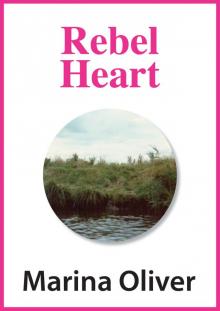 Rebel Heart
Rebel Heart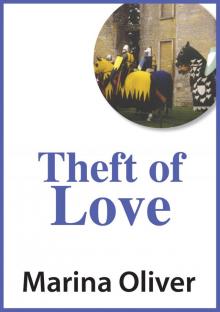 Theft of Love
Theft of Love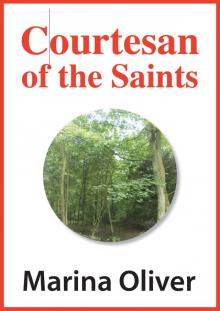 Courtesan of the Saints
Courtesan of the Saints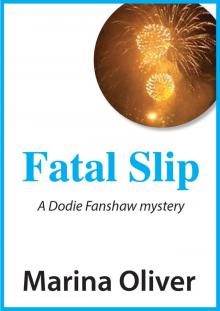 Fatal Slip
Fatal Slip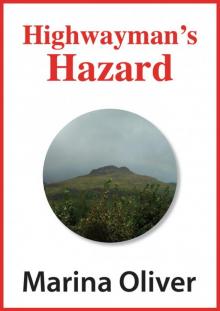 Highwayman's Hazard
Highwayman's Hazard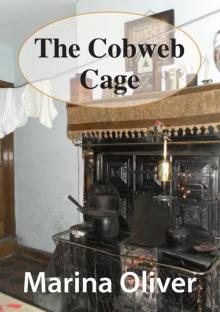 The Cobweb Cage
The Cobweb Cage The Irish Bride
The Irish Bride Apple Blossom Bride
Apple Blossom Bride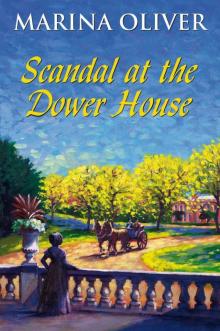 Scandal at the Dower House
Scandal at the Dower House Eugenie and the Earl
Eugenie and the Earl Her Captive Cavalier
Her Captive Cavalier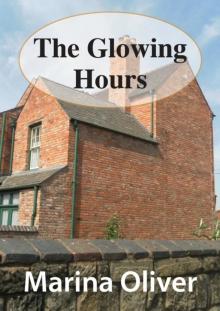 The Glowing Hours
The Glowing Hours Sibylla and the Privateer
Sibylla and the Privateer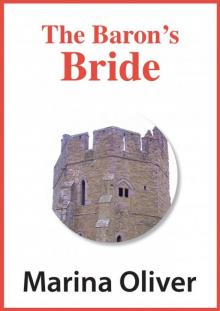 The Baron's Bride
The Baron's Bride Player's Wench
Player's Wench Gavotte
Gavotte The Chaperone Bride
The Chaperone Bride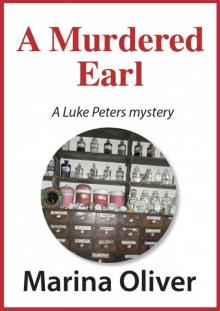 A Murdered Earl
A Murdered Earl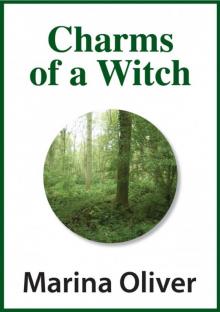 Charms of a Witch
Charms of a Witch Convict Queen
Convict Queen The Accidental Marriage
The Accidental Marriage